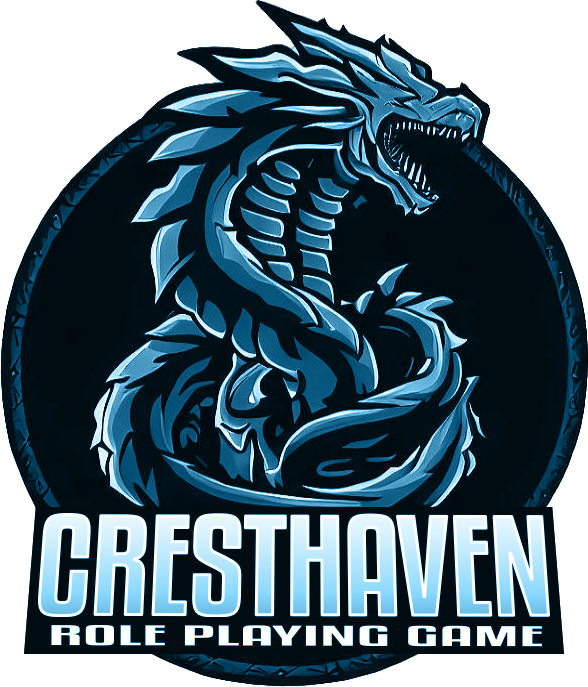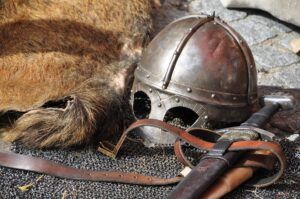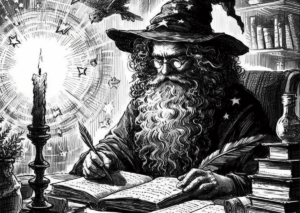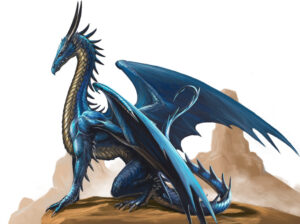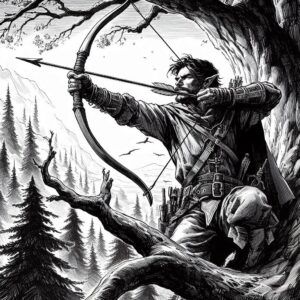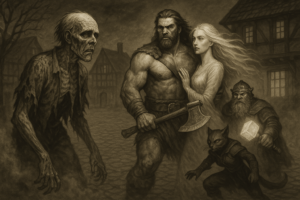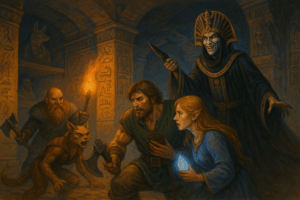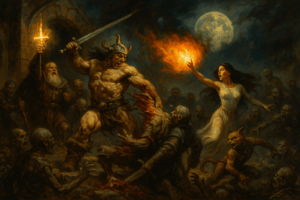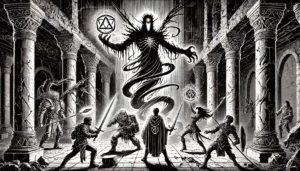The Temple and the Thorn
The morning after the corpse was felled, Cresthaven dressed itself in calm.
Inside the Temple of Aysys, light filtered through tall, narrow windows of pale glass, casting shafts of carefully directed radiance onto polished stone floors. Incense drifted in perfumed curls, sweet enough to mask the earthy scent that once defined the temple’s ceremonies. The faithful sat in orderly rows on wooden benches, heads bowed, robes pressed, their prayers echoing in soft murmurs that never rose above a certain volume.
At the pulpit stood Father Harder, illuminated by the focused rays of morning light as if nature itself had been directed to spotlight his sermons.
He was grace given structure—his blonde hair neatly parted without a strand out of place, his gold-and-white robes immaculate in their crisp folds, his voice ringing with conviction that filled the chamber without echoing into wildness.
“Aysys grants us healing,” he intoned, hands rising in practiced arcs. “She blesses the earth with growth. But growth must be pruned. Power must be guided. As the Sky King brings light to darkness, so must we guide the wild into order.”
The heavy oak doors at the rear of the temple groaned open, sending a shaft of morning light across the congregation. Heads turned, prayers faltered, and Father Harder’s words momentarily caught in his throat.
Four figures stood silhouetted against the brightness: a tall, broad-shouldered man with weathered features; a slender elven woman whose copper skin seemed to hold an inner light; a stout dwarf whose auburn beard was braided with silver talismans; and a lithe catfolk whose golden eyes blinked against the temple’s incense.
Father Harder recovered quickly, though his knuckles whitened around the edges of his pulpit. His hands opened in practiced benediction, fingers spreading precisely like the petals of a flower that blooms on command. “Let us remember: rebellion is not freedom—it is the illusion of freedom. And the storm obeys the sea when the tide is righteous.”
The four moved to the back of the congregation, their travel-worn appearance a stark contrast to the pressed robes and scrubbed faces of the faithful. Whispers rippled through the rows of worshippers. Some glanced back with barely concealed fear, others with something like desperate hope.
Durim’s jaw clenched, the muscles working beneath his beard, his grip tightening on his warhammer’s haft until his knuckles whitened. Thimara narrowed her eyes, tail lashing once beneath her cloak before falling still. Aelinthir’s fingers flexed near the hilt of her staff, wild magic crackling almost imperceptibly around her fingertips.
Kaelen simply said, “This isn’t her.” Three words that carried the weight of an accusation, a lament, and a promise.
Outside, the villagers swept their thresholds with brooms worn to nubs, lit their hearths with shaking flints, and offered small prayers to Aysys with trembling hands and downcast eyes. The scent of fresh bread wafted from the Cross Arms Inn, its hearty aroma a defiant gesture against the lingering stench of decay. Children’s laughter echoed from narrow alleys—short-lived and unsure, like birdsong before a storm.
But no one spoke Elara’s name, as if the syllables themselves might summon further horrors. No one mentioned the unnatural blue glow that had burned in her father’s eyes when he had lurched across the square. And though the dark stains in the village square had been hastily covered with fresh hay, no one walked too near them, their footpaths curving in unconscious arcs around the scene of last night’s violence.
After the sermon, when the faithful had filed out with measured steps and downcast eyes, Father Harder greeted them in the empty nave with professional warmth. His eyes crinkled kindly when he smiled, revealing the man he might have been in another life. But his hands trembled slightly when he shook Kaelen’s, a tremor that belied his composure.
“I’ve heard of your bravery,” he said, voice lowered as if the walls themselves might carry his words elsewhere. “The village owes you much. And I… owe you answers.”
“Her father wasn’t buried in the cemetery,” Kaelen stated, his voice low and rough as stone against stone.
“No,” Aelinthir confirmed, her slender form seeming to gather shadows around her despite the bright light streaming through the windows. “Elara said he was granted ‘special honor.’ The temple grounds.”
Durim snorted, the sound rumbling from deep within his broad chest. The dwarf ran calloused fingers through his beard, now flecked with grave soil that no amount of washing had fully removed. “A fine way to say you’re useful to Lord Bakkus.”
“Or loyal to Father Harder,” Thimara added, her feline ears twitching beneath her hood. Her golden eyes narrowed as she studied the priest. “He’s got all of them trained like temple cats, purring when stroked and hiding when threatened.”
Father Harder’s smile tightened. “Perhaps we should speak elsewhere.”
He led them from the chapel through a small garden path where herbs grew in geometric patterns, past fountains whose waters flowed in regulated streams. They came at last to the older wing of the temple, a section clearly less frequented, less maintained—almost forgotten. Here, nature was less easily contained. Vines cracked through the stone, seeking light with patient determination. Moss grew wild along the edges of the tiled floor, spreading in patterns that defied human design. The air was cooler, earthier, carrying hints of soil and growing things rather than incense and polish.
“The crypts,” Harder explained, gesturing toward a descending stairway. “And the sanctum beneath. The oldest part of the temple. Long sealed, long misunderstood.”
The temple itself was beautiful in the way a museum is beautiful—still, curated, cold. A monument to memory rather than life.
The outer facade bore the scars of change, though few would recognize them without knowing what to seek. Vines that had once been allowed to overgrow the walls in wild celebration were now pruned to tight, decorative loops, constrained into geometric patterns that spoke more of control than growth. The great relief of Aysys—once a flowing goddess wrapped in leaves and stars—had been recut by careful hands, her arms now folded in restraint rather than open in welcome. The old symbols of transformation—snakes shedding skins, seeds sprouting tendrils, rivers carving new paths—were dulled beneath limewash and gold filigree, whispers of their former meaning barely visible in the morning light.
Yet people still came, drawn by habit and hope and fear.
They laid wildflowers at her altar, their petals drooping as if in mourning. They burned rosemary at her feet, the fragrant smoke rising in spirals that seemed to grasp for something beyond reach. And her name was still sung in the spring rites, though the melodies had grown more measured, the celebrations more restrained with each passing year. The villagers believed they still worshipped Aysys, their beloved goddess of transformation and renewal.
But it was not the goddess they honored. It was the shape they had made her fit—a tamed thing, stripped of mystery, bound in ritual and regulation.
A carved stone door stood at the far end of the corridor, framed by an arch of ivy that had resisted every attempt to trim it back. The leaves shimmered with dew that could not possibly have reached this sheltered place. A dark indentation remained on the wall above—an outline in the shape of a figure with outstretched arms, now gone, leaving only its shadow pressed into the stone.
“It was once kept here,” Harder said, looking up at the empty space with something like longing. “The Icon of Aysys. A relic, or a symbol. Perhaps both. It hung above the threshold for generations, guarding the way to the inner sanctum. And then, a month ago… a man came.”
“Black cloak? A book of skin?” Thimara guessed, her claws extending slightly from her fingertips.
Harder nodded, a shudder passing through his frame. “He asked strange questions. Questions that seemed innocent until later reflection revealed their purpose. He spoke of… hidden truths. Of power beneath the earth. Then vanished between one prayer bell and the next. And so did the Icon.”
“What lies beyond the door?” Aelinthir asked, her voice carrying the whisper of leaves in a midnight breeze.
“Some say it is a sealed chamber,” Harder replied, his gaze flicking nervously between the door and the shadows that gathered at the corridor’s end. “Others believe it to be a sanctum of the old faith, where Aysys dwelled in her truest form. I do not know. Only that since the Icon vanished… dreams have returned.”
He hesitated, glancing over his shoulder as if to ensure they were truly alone. “Visions. Whispers. A woman in the water, her eyes reflecting stars that do not shine in our skies. Hands reaching from the soil. Not to pull—but to give.”
Without waiting for permission, Aelinthir stepped toward the door. Ancient instinct guided her, the magic in her blood responding to something older still. She laid her palm on the cool stone, which seemed to warm beneath her touch.
The world shifted.
For a moment, all of them were elsewhere, torn from the present and cast into visions as clear as memory yet strange as dreams.
Durim saw a hammer of stone, ancient and unadorned, crumbling to dust in hands that might have been his own. A field of grain stretching to the horizon, golden stalks turning to glass with a sound like silent screaming. A mountain—perhaps the very peak that had birthed his clan—opening like a wound, revealing veins of light instead of ore.
Thimara stood in a grove at twilight, the boundary between day and night as tangible as a silk curtain brushing her fur. Hundreds of black-eyed figures watched her from between ancient trees, their forms neither threatening nor welcoming, simply present. She was barefoot, the way she had not been since kittenhood. The soil pulsed beneath her toes with a heartbeat that was not her own yet felt intimately familiar.
Kaelen stood waist-deep in a flooded plain, water stretching endlessly in all directions, reflecting a sky filled with unfamiliar constellations. Before him, a figure of light knelt in the water, its form shifting between woman and wave and something beyond naming. It held out hands that were sometimes human, sometimes flowing current. “You came back,” she whispered, voice like water over stone. “After so long, you remembered the way.”
And Aelinthir—Aelinthir saw a river of stars winding through a forest with no horizon, trees older than kingdoms stretching toward a sky that had never known mortal light. The stars flowed like water, yet she could reach out and grasp them, could feel their cold fire against her skin without burning. The sky blinked like the inside of a great eye, watching her with ancient recognition.
Then it was gone, the visions shattered like reflections in disturbed water.
They staggered back, breath caught in their chests, limbs heavy as if they had traveled leagues in those brief moments.
“What did you see?” Harder asked, voice low, not accusatory—but afraid of the answer. His hands clutched his holy symbol, knuckles white with strain.
“Dreams,” Kaelen said, steadying himself against the wall. “The same ones we’ve had for weeks. The ones that led us here.”
“You’ve been called,” Harder whispered, something like envy slipping into his tone. “Just as I was. Just as they were.”
“Who’s ‘they’?” Durim asked, hammer half-raised as if expecting an attack from the shadows that seemed to deepen around them.
Harder didn’t answer. Not directly. His gaze drifted to the empty space where the Icon had once hung. “There are those who believe Aysys should remain wild. That the old ways must be restored. They… gather. In secret. In caves beyond the northern ridge. In groves where the moonlight falls differently. I’ve tried to lead them. Tried to protect them. But they don’t trust me.”
“Because you serve Bakkus,” Aelinthir said, her words an observation rather than an accusation.
“I serve the people,” Harder snapped, a flush rising to his pale cheeks. Then, softer, “Or I try. Do you think I live in comfort? I lie awake hearing her voice. Feeling her grief. But what do I do? Tell them the truth? That their goddess weeps behind our walls? They would burn the temple to the ground. Or worse—bow to something they don’t understand.”
His breath shook, and for a moment, the perfect priest was gone, replaced by a man drowning in certainties that had become quicksand. “I don’t know what’s right anymore.”
“Then help us find out,” Kaelen said, placing a heavy hand on Harder’s shoulder. “Show us where to begin.”
Harder straightened, his composure slowly returning like a mask being carefully reapplied. “There is one place you must go. One truth you must see with your own eyes.”
Shady Hollows Cemetery lay at the far edge of the woods, just beyond where the valley dipped into pine and shadow. They followed a moss-covered trail past the rotted signposts whose lettering had long ago surrendered to wind and rain, down a road of knotted roots and slick stones worn smooth by the passage of mourners’ feet.
By the time they arrived, clouds had begun to gather in the west, their dark bellies heavy with the promise of rain. The wind carried the scent of loam and decay, of endings and beginnings inseparably entwined.
The cemetery was vast, spreading across a gentle hollow where the morning mist lingered between tombstones like reluctant ghosts. Winding paths snaked between graves so ancient their names had eroded from stone, leaving only smooth faces turned toward an indifferent sky. Ivy climbed over crooked markers, embracing the dead in slow, green patience. Trees leaned in from the edges, their trunks black with age, branches reaching over the graves like protective arms.
They found the grave at the edge of a slope, where newer plots gave way to wilderness. A fresh marker. Polished. Simple. It bore the name: Marcus Tullor.
The soil around it was split asunder.
Clumps of wet earth scattered outward like the explosion of a great impact, frozen in their moment of violence. The grass had not grown back, as if the very soil rejected new life. The coffin below had been broken—splintered from within, fragments of wood thrust upward through the disturbed earth like broken bones.
“Gods,” Thimara whispered, her keen nose wrinkling at a scent only she could detect.
“There’s no signs of entry,” Kaelen said, circling the grave with a tracker’s practiced eye. “Nothing climbed in. No shovel marks. No footprints save ours.”
“It was already here,” Aelinthir said, her voice distant as she traced arcane symbols in the air, her fingertips trailing faint blue light. “Something within him. Waiting.”
“Or something brought him back,” Durim muttered, kneeling to touch the soil with reverent hands. “Something that knows no respect for the boundaries between life and death.”
Overhead, thunder cracked like the breaking of great stones. The wind picked up, sharp and cold as a blade against skin. Rain began to fall—soft at first, tentative droplets that kissed their faces, then faster, heavier, until it drenched them in seconds, plastering hair to scalps and clothing to skin.
Kaelen looked up toward the blackening sky, rain streaming down his face. “This isn’t just weather.”
“No,” Aelinthir agreed, her magic flaring instinctively around her like a shield against the downpour. “It’s an omen. A warning.”
They turned back toward the village, the storm rising behind them like a great tidal wave poised to crash upon the shore. But something lingered in the air of the cemetery—beneath the soil, between the graves, in the places where shadow met stone.
Watching.
Waiting.
Remembering.
The rain became a flood, sheets of water falling as if the sky itself had ruptured.
By the time the four returned to the edge of the woods, the sky had darkened to the color of bruised flesh. Thunder cracked above like the splitting of old stone. The trees writhed beneath the wind, their branches creaking in protest, leaves torn free in green-black flurries that swirled in mad dances. Lightning split the sky in jagged arcs of blinding white—and each time it struck, it struck the cemetery.
Over and over, the hollow flashed with silver fire, illuminating the grounds in stark relief.
And in the flickering light, they saw them—shapes. Moving between graves. Shambling. Tall. Crooked. Some crawling on too many limbs, some upright but bent at impossible angles. Their outlines unclear, their movement jerking and unnatural, as if controlled by hands that did not understand how bodies should move.
Kaelen stopped short, one hand falling to the greatsword at his back. “They’re rising.”
“No,” Durim growled, voice low, warhammer gripped tight in both hands, its runes beginning to glow with answering power. “They’ve been waiting. All this time, they’ve been waiting for the call.”
“Go!” Thimara hissed, already turning toward the path to the temple, her eyes reflecting the lightning in eerie gold. “We can’t fight the storm too.”
They sprinted up the hillside path, boots slick with mud, cloaks torn by wind that seemed to claw at them with deliberate malice. Branches snapped around them like whipcracks. The storm did not roll—it hunted, lightning striking ever closer, thunder shaking the very ground beneath their feet.
The temple came into view just as a bolt of lightning struck a twisted ash tree at the edge of the road, splitting it down the middle in a roar of white fire that illuminated the scene in stark, terrible clarity. For an instant, they saw the village below—and darker shapes moving through its streets.
Harder stood at the temple doors, robe flung around him like wings in the gale, a lantern in one hand casting wild shadows, the other raised in a gesture of protection. His eyes were wide—not with welcome, but with terror barely concealed beneath the thin veneer of faith.
“In!” he shouted, voice nearly lost in the howling wind.
They crossed the threshold just as the wind howled like a dying god, a sound of rage and grief so primal it seemed to shake the foundations of the temple itself. Harder slammed the doors shut and bolted them with a steel rod engraved with sunbursts and spirals, symbols whose meaning had been lost to all but the most dedicated scholars.
He turned and pressed his back to the wood, the rain hammering the roof above like a thousand impatient fists, the thunder shaking the stone beneath their feet until the candles danced and flickered.
He drew a trembling breath, touched his holy symbol with fingers that betrayed his fear, and whispered, “Best wait till the storm passes.”
Aelinthir stepped to the window, peering through glass streaked with rain. Another flash of lightning lit the graveyard in the valley below.
More movement.
Too many shapes to count now, rising from the earth like a terrible harvest.
She turned slowly to the others, her elven features composed but eyes wide with the knowledge of what was to come. “Something has awakened.”
In the chapel’s silence, the candles flickered low, as if the very light feared what might be coming with the dawn.
Discover more from Cresthaven RPG
Subscribe to get the latest posts sent to your email.
